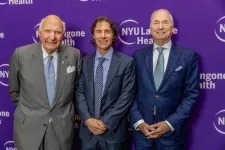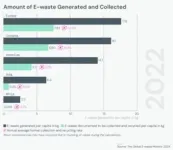(Press-News.org) NYU Langone Health has received a $15 million gift from innovators and philanthropists Wayne G. Holman, MD, and Wendy Holman to further elevate the world-class treatment and study of endocrine disorders in the newly named and endowed Holman Division of Endocrinology, Diabetes & Metabolism.
“Wayne and Wendy’s generosity in this important area of medicine will help NYU Langone further enhance our exceptional research, education and clinical care within the Holman Division of Endocrinology, Diabetes & Metabolism,” said Robert I. Grossman, MD, dean and CEO, NYU Langone. “NYU Langone has a rich history of developing novel treatment options to provide superior outcomes for the most complex cases, and thanks to this endowment, we can sustain these efforts over time.”
“This impactful gift will propel the division into its next phase of growth by establishing new translational research, clinical trials, academic forums, and advancing clinical care, among other initiatives,” said Steven Abramson, MD, Frederick H. King Professor of Internal Medicine and chair of the Department of Medicine at NYU Grossman School of Medicine. “I am excited for the medical advances that will undoubtedly come about because of the Holmans’ deep investment.”
The Holman Division of Endocrinology, Diabetes, & Metabolism, part of the Department of Medicine at NYU Grossman School of Medicine, is among the best in the country, ranked No. 2 U.S. News & World Report’s specialty rankings for 2023-24. The division’s robust research program has made major contributions to the studies of diabetes care, thyroid disease, obesity, neuroendocrinology, lipid disorders, and bone health.
Dr. Holman was recently elected to NYU Langone’s Board of Trustees. His gift is the largest ever given to the NYU Grossman School of Medicine by an alumnus.
“NYU Langone and its medical school gave me the gifts of knowledge, experience, and lifelong friendships. Wendy and I are happy to give back by supporting the dedicated and innovative researchers, physicians, and caregivers in the Holman Division of Endocrinology, Metabolism, and Diabetes who care for patients and advance work toward new treatments and cures,” said Dr. Holman. “We look forward to the achievements. Many thanks to those working so hard on these endeavors.”
For more than 18 years, Dr. Holman has served as founder and CEO of Ridgeback Capital, a private investment firm focusing on the life sciences. Dr. Holman’s work at Ridgeback Capital has provided funding to companies that have developed medicines for various cancers, infectious diseases, rare pediatric diseases, and more. In 2016, the Holmans founded Ridgeback Biotherapeutics, a biotech company focused on developing life-saving medications to treat diseases with limited or no treatment options. Ridgeback Biotherapeutics has brought two medicines—for Ebola and COVID-19—to regulatory approvals around the world. For decades, Dr. Holman and Mrs. Holman have leveraged their own success to help vulnerable populations, facilitating drug research and development at over a hundred biopharmaceutical companies.
“Wayne and I are happy to support advancements in collaboration with NYU Langone that will have a tangible positive effect on health and alleviate human suffering,” said Mrs. Holman. “We are confident the division will continue to make a significant impact on the field and benefit countless individuals, and we are proud to be part of that.”
“Wendy and Wayne are people who have dedicated every aspect of their lives to helping others. They see NYU Langone as an institution with the ability to magnify every dollar, and through which they can have exponential impact,” said Kenneth G. Langone, chair of the NYU Langone Board of Trustees. “And they’re right.”
Media Inquiries
Katie Ullman
Phone: 646-483-3984
Kathryn.ullman@nyulangone.org
END
Visionary $15 million gift from Wayne & Wendy Holman to NYU Langone Health ensures continued excellence in newly named Holman Division of Endocrinology, Diabetes & Metabolism
2024-03-20
ELSE PRESS RELEASES FROM THIS DATE:
Rural and minority dementia patients face disparities in access to neurologists
2024-03-20
SPOKANE, Wash.—Getting dementia diagnosed can be a long and difficult process for anyone, but some may face additional challenges based on race or ethnicity and where they live, according to a study led by Washington State University researchers.
The study of nearly 95,000 Washington state residents found that people living outside of urban areas as well as Native American and Hispanic people face longer travel distances to be seen by neurologists. The researchers said these disparities could be contributing to delayed diagnoses, which can result in higher costs of care, ...
Fish fed to farmed salmon should be part of our diet, too, study suggests
2024-03-20
Paper available at: https://drive.google.com/drive/folders/144cIFPtY2VSaqV8AfFHy_hh6xlDcLShy?usp=sharing
The public are being encouraged to eat more wild fish, such as mackerel, anchovies and herring, which are often used within farmed salmon feeds. These oily fish contain essential nutrients including calcium, B12 and omega-3 but some are lost from our diets when we just eat the salmon fillet.
Scientists found that farmed salmon production leads to an overall loss of essential dietary nutrients. They say that eating more wild ‘feed’ species directly could benefit our health while reducing aquaculture demand for finite marine resources.
Researchers analysed ...
AI ethics are ignoring children, say Oxford researchers
2024-03-20
Researchers from the Oxford Martin Programme on Ethical Web and Data Architectures (EWADA), University of Oxford, have called for a more considered approach when embedding ethical principles in the development and governance of AI for children.
In a perspective paper published today in Nature Machine Intelligence, the authors highlight that although there is a growing consensus around what high-level AI ethical principles should look like, too little is known about how to effectively apply them in principle for children. The study mapped the global landscape of existing ethics guidelines for AI and identified four ...
Cleaning up environmental contaminants with quantum dot technology
2024-03-20
NEW ORLEANS, March 20, 2024 — The 2023 Nobel Prize in Chemistry was focused on quantum dots — objects so tiny, they’re controlled by the strange and complex rules of quantum physics. Many quantum dots used in electronics are made from toxic substances, but their nontoxic counterparts are now being developed and explored for uses in medicine and in the environment. One team of researchers is focusing on carbon- and sulfur-based quantum dots, using them to create safer invisible inks and to help decontaminate water supplies.
The researchers will present their results today at the spring meeting of the ...
New model clarifies why water freezes at a range of temperatures
2024-03-20
NEW ORLEANS, March 20, 2024 — From abstract-looking cloud formations to roars of snow machines on ski slopes, the transformation of liquid water into solid ice touches many facets of life. Water’s freezing point is generally accepted to be 32 degrees Fahrenheit. But that is due to ice nucleation — impurities in everyday water raise its freezing point to this temperature. Now, researchers unveil a theoretical model that shows how specific structural details on surfaces can influence water’s freezing point.
The researchers will present their results at the spring meeting of the American Chemical Society (ACS). ACS Spring 2024 is a hybrid meeting being held virtually ...
Hitting this stretchy, electronic material makes it tougher
2024-03-20
NEW ORLEANS, March 20, 2024 — Accidents happen every day, and if you drop your smartwatch, or it gets hit really hard, the device probably won’t work anymore. But now, researchers report on a soft, flexible material with “adaptive durability,” meaning it gets stronger when hit or stretched. The material also conducts electricity, making it ideal for the next generation of wearables or personalized medical sensors.
The researchers will present their results today at the spring meeting of the American Chemical Society (ACS). ACS Spring ...
Severe lung infection during COVID-19 can cause damage to the heart
2024-03-20
SARS-CoV-2, the virus that causes COVID-19, can damage the heart even without directly infecting the heart tissue, a National Institutes of Health-supported study has found. The research, published in the journal Circulation, specifically looked at damage to the hearts of people with SARS-CoV2-associated acute respiratory distress syndrome (ARDS), a serious lung condition that can be fatal. But researchers said the findings could have relevance to organs beyond the heart and also to viruses other than SARS-CoV-2.
Scientists have long known that COVID-19 increases the risk of heart attack, stroke, and Long COVID, ...
Are there racial and ethnic differences in Medicare costs for older adults with dementia?
2024-03-20
In an analysis of information on Medicare beneficiaries with dementia, Medicare expenditures were higher for Black and Hispanic individuals compared with whites. The Journal of the American Geriatrics Society analysis also found that expenditures were highest for Black beneficiaries in every phase of care.
The average total Medicare expenditures after being diagnosed with dementia were $165,730 for Black beneficiaries, $160,442 for Hispanic beneficiaries, and $136,326 for white beneficiaries. In the year preceding and immediately following ...
Does sedentary leisure time affect men’s risk of erectile dysfunction?
2024-03-20
Previous research has identified genetic variants linked to sedentary leisure behavior, which includes activities such as watching television, using a computer, and operating a vehicle. In a new analysis published in Andrology, a higher genetic susceptibility to leisure computer usage was associated with a greater risk of erectile dysfunction in men.
In the analysis of data on more than 200,000 men, each 1.2 hour increase in leisure computer usage predicted 3.57-fold greater odds of erectile dysfunction. There was no evidence to suggest ...
Can taking antibiotics combat the gut bacteria that contribute to the pathogenesis of COVID-19?
2024-03-20
New research indicates that antibiotics can effectively target bacteria in the gut that harbor the virus that causes COVID-19 and produce toxin-like peptides that contribute to COVID-19-related symptoms. In the study, which involved 211 participants and was published in the Journal of Medical Virology, individuals who received early antibiotic treatment after having COVID-19 recovered more quickly than those who did not receive antibiotics.
The authors had already evaluated the efficacy of certain antibiotics in SARS-CoV-2-infected bacterial cultures in vitro, and this new study demonstrates ...





